May 10, 2013
Dear waste pickers’ organizations and allies,
We invite you to read this 5th edition of “Struggles and Victories: Waste pickers on the Frontline”, the second bi-monthly newsletter of 2013. You will certainly be impressed SWaCH cooperative’s powerful campaign called “Send it Back”, in which the workers are fighting multinational companies’ irresponsible disposal of sanitary napkins. We are also extremely proud that for the first time in more than two decades of the Goldman Enviromental Prize, a grassroots, third generation Colombian recycler named Nohra Padilla has received this tremendous and well-deserved honor, and got to meet President Barack Obama! The prize coincides with a landmark victory in the city of Bogota, where 4,000 waste pickers are receiving payment for their work after more than two decades of organizing efforts. Another recent award recognized the global significance of waste pickers: Chintan, based in India, received the United Nations Intercultural Innovation Award for grassroots projects that encourage cultural exchange. The waste pickers of Argentina, the cartoneros, were also recognized internationally when Sergio Sánchez, a member of the Movimiento de Trabajadores Excluidos (MTE), accompanied Pope Francisco during his inauguration at the Vatican.
Not all news is good news as the struggle continues in Pune, where new contractors have violated labor and minimum wage laws and SWaCH workers are using public records requests and the legal system to fight for their livelihoods and dignity. You can read more about SWaCH in their latest newsletter. In Brazil, the fight against incineration continues. In São Bernardo do Campo, waste pickers attended a public debate about incineration between the municipal government and a coalition against incineration. The city plans to install an incinerator that will burn waste in several surrounding cities. Read about the waste pickers’ powerful acts of protest at the debate.
Global Waste Pickers’ Day continues to grow, with messages, support and social media outreach from more than 14 countries. This year we are proud to see waste pickers mobilizing for their rights in Nepal and the Democratic Republic of Congo!
In solidarity,
Lucia and Deia
Communication Support
WIEGO Waste pickers Program
Table of contents
Asia
India
Latin America
Africa
International
Asia
Informal waste workers deserve respect and recognition! Waste pickers campaign in Nepal (Nepal – March 2013)
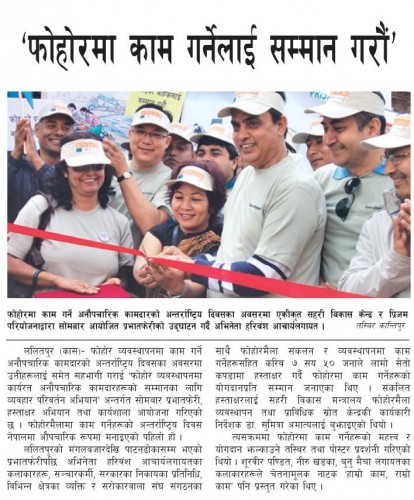
Nepal waste workers campaign for recognition and respect – newspaper clipping. Photo credit: Srijana, Practical Action.
PRISM project organised a Behavior Change Campaign on March 25, 2013 with the objective of garnering respect and recognizing waste worker’s contributions in the solid waste management sector in Nepal. The campaign carried the brand message, “Informal Waste Workers: Deserving respect for their contribution.” PRISM project has identified more than 5,000 informal waste workers in the Kathmandu valley and about 46 informal self-help groups. The Behavior Change Campaign included a Walkathon, Signature campaign and consultative workshop to respect and recognize informal waste workers in solid waste management. There were about 750 participants. Read the complete article with photos
India
SWaCH’s “Send it Back” Campaign Fights for Proper Disposal of Sanitary Napkins to Protect Waste Pickers’ Health
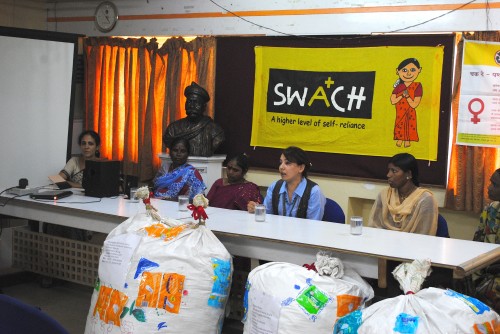
A press conference in March 2013 to address the issue of proper disposal of sanitary napkins. Photo credit: SWaCH.
SWaCH waste pickers’ cooperative began bringing attention to a little known but very important issue more than two years ago: the proper disposal of sanitary napkins. Soiled sanitary napkins expose waste pickers, who work with their bare hands, to respiratory and gastrointestinal ailments, skin and eye infections and allergies. After sending numerous requests to manufacturers of sanitary napkins and diapers and receiving no response, SWaCH came up with a last resort. The cooperative collected used sanitary napkins and sent them back in boxes to the companies’ corporate offices as a gift on March 8th, International Women’s Day, to make them experience firsthand what waste pickers undergo while handling such waste. See the full update of the situation in this article + photos
SWaCH’s campaign against contractor’s violation of labor and minimum wage laws
The Pimpri Chinchwad Municipal Corporation (PCMC) authorities had been shockingly apathetic to the inhumane treatment of over 400 waste workers employed by its contractor, BVG Kshitij company. This treatment and the privatization of waste management in Pune that has forced SWaCH waste pickers’ cooperative to compromise its work have been going on since the end of 2012. In early March, the Kagad Kach Patra Kashtakari Panchayat (KKPKP) waste pickers’ union began a sit-in to protest their treatment. This article is a brief update on the 6 day ‘sit-in’ organised by KKPKP outside the PCMC that concluded when the Municipal Commissioner conceded to KKPKP’s demands when he was presented with documents collected using the Right to Information Act. These documents prove that the contractor has been manipulating attendance records, not providing required employees and equipment, and violating labor and minimum wage laws.
Read about the sit-in to protest inhumane treatment of waste pickers by the PCMC and its contractor
Read about how the PCMC and its contractor are violating minimum wage and contract labor laws
Chintan wins the United Nations-BMW Intercultural Innovation Award (February 2013)
In February, Chintan was awarded the United Nations-BMW Intercultural innovation Award in Austria. The award “aims to identify the most innovative grassroots projects that encourage intercultural exchange around the world.” It consists of $15,000 and technical assistance for Chintan’s work for a one-year period. Chintan will be using the grant from the award as well as technical guidance for furthering its work in integrating and securing safe, secure and stable livelihoods in recycling for migrant waste pickers and work with waste generators in Delhi to better understand and appreciate the contribution of waste pickers to cities and the planet. Chintan’s press release
Chintan Celebrated Earth Day at New Delhi Railway Station (India – April 2013)
Chintan celebrated Earth Day on April 22nd, in partnership with the Indian Railways at the New Delhi Railway Station. The Chintan team, along with waste pickers with Safai Sena, encouraged commuters to sign pledges, to not litter the station and to crush plastic bottles before discarding them. The group set up pledges at two platforms where the waste recyclers educated passengers on the work they do and how they keep the station clean. Chintan has a contract with the Indian Railways and the waste pickers work at four different railways in New Delhi. They have recently been provided with electricity, allowing them to set up a plastic shredder where they process the plastic bottles. The passengers pledged to crush bottles before discarding them and to dispose waste only in the dustbins. The event was attended by the Station Master as well as the Railway Police force. Article and photos about the event
The SWaCH Newsletter is out! (India – February 2013)
SWaCH is a collective of self-employed waste pickers that provides waste collection and management services. It publishes a quarterly newsletter. The latest has a lot of great articles! Included: articles about SWaCH and KKPKP workers making their demands known to state government officials last month. They demanded registration of waste pickers as workers, livelihood protection and education for waste pickers’ children. In another article, SWaCH gives an update on the fight against the privatization of waste management in Pune and discusses why weight based systems — such as the one a private contractor there is using — don’t work. The weight-based system could even discourage citizens from recycling! In other news, SWaCH will be launching a school program on waste generation, which aims to make school children more aware about waste, the people behind it, and how it affects the environment. Also included is the moving biography of a proud SWaCH waste picker, and a list of trainings and workshops, including one about India’s Right to Education, a law that gives disadvantaged children access to education. This is only a summary! Check out the complete newsletter!
Women’s waste picker cooperative in Delhi transforms recyclables into art (India – March 2013)
Seemapuri is one of the longest standing communities of waste pickers situated on the northeast outskirts of Delhi. It is a tight knit community of mainly Muslims and some Dalits from West Bengal. In that neighborhood, most of the community earns a living by collecting, sorting, and recycling. In March of this year, Kabad Se Jugad, the first all-women cooperative in urban India to make arts and crafts out of recyclable materials launched in the Seemapuri neighborhood. In partnership with New York-based artist, Rolando Politi, also known as Recycle and Pray, these waste pickers are transforming these materials into objects and art, “relying on inspiration and creativity (in Hindi: jugad) to guide our production process” and “bringing our talent of improvising from waste to the wider world.” Read full article
Latin America
“A time to celebrate: dreams come true for the organized waste pickers of Bogotá” (Colombia – March 2013)
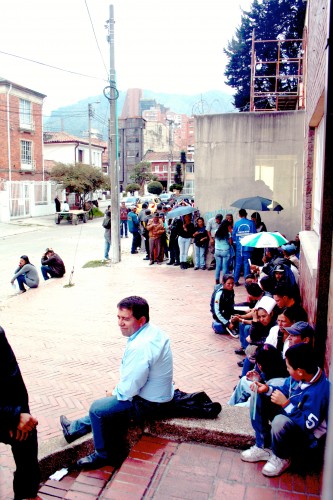
“No more speeches! No more announcements!” waste pickers shouted after finally receiving payment as service providers. Photo credit: Federico Parra.
After over 20 years of fighting for recognition and inclusion in the city’s waste management system, the organized waste pickers of Bogotá finally saw their dreams come true when the municipal government issued them in March their first payment for the collection and transportation of recyclable materials. It was the first time they were paid as public service providers to the city. This victory cannot be explained without looking back at the ongoing struggle of the Asociación de Recicladores de Bogotá (ARB) for waste pickers’ rights and livelihoods. The full article summarizes the history of the Bogotá struggle as well as the steps the government must take as part of the court order mandating the inclusion of waste pickers in the city’s solid waste management.
Part 2 of “Chronicles of a Fight for Inclusion: The December 2012 Garbage Crisis of Bogotá” (Colombia – March 2013)
The video discusses Auto 275, a Bogotá law meant to protect waste pickers’ rights as public service providers and to guarantee payment. It led to the court order that resulted in the organized waste pickers of Bogotá receiving priority as service providers and receiving payment for the first time. Auto 275 is explained via interviews conducted by a Bogotá waste picker with government authorities. The version with English subtitles is coming soon!
Just released with English subtitles: “Chronicles of a Fight for Inclusion: The December 2012 Garbage Crisis of Bogotá” (Colombia – March 2013)
“Chronicle of a Fight for Inclusion: The December 2012 garbage crisis of Bogotá” (now with English subtitles) shows organized waste pickers taking actions to reduce the impact of the garbage crisis in Bogota and giving an account of the series of unfortunate events and bad decisions that led to it, and of their struggles and victories throughout time to secure their rights and livelihoods.
“Recicladores in Bogotá receive trucks and payment” (Colombia – March 2013)

Recicladores of Bogotá’s El Triunfo cooperative receiving trucks paid for by the city government. Credit: Nohra Padilla.
In another update with photos, Nohra Padilla talks about waste pickers with the El Triunfo waste pickers’ cooperative in Bogotá receiving recycling trucks paid for by the UAESP, Bogotás solid waste management department, as part of the process of being recognized as service providers. Recicladores de Bogotá recibem carros y pagamento (in Spanish)
A cartonero goes to the Vatican with the Pope (Argentina – March 2013)
The inauguration of Pope Francisco was an exciting event for Argentina but especially for the waste pickers of Argentina, called cartoneros in the country. Religion aside, this event helped shed light on the role of the cartoneros when Sergio Sánchez, a cartonero and member of the Movimiento de Trabajadores Excluidos (MTE) — a movement for waste pickers’ rights — accompanied the new Pope to the Vatican for his inauguration. The pope had requested the presence of a waste picker. Sánchez had participated for several years in the Pope’s masses held in Buenos Aires. The MTE movement says through his participation in the ceremony, Sánchez was representing all excluded workers of Buenos Aires.
Read the press releases from the MTE (in Spanish)
News article in English
Waste pickers’ network of Uruguay (RECOLE) focusing on the country’s packaging law (Uruguay – March 2013)

Uruguay’s RECOLE – a waste pickers’ network formed around the national packaging law. Credit: RECOLE.
After many months of hard work, on March 10, 2013, the Network of Uruguayan Waste Pickers Organized Around the National Packaging Law (RECOLE) was officially formed. RECOLE is made up of waste pickers from five different districts where the packaging law — which mandates producer responsibility — has been implemented. RECOLE’s objective is to develop a platform of demands and an agenda that will communicate with public and private institutions. More information (in Spanish)
The fight against incineration continues in Brazil (Brazil – April 2013)

Waste pickers protest at a meeting about São Bernardo, São Paulo’s installation of an incinerator. Credit: MNCR.
The fight against incineration continues in Brazil. In São Bernardo do Campo, waste pickers attended public debate about waste to energy between the municipal government and the Anti-Incineration Coalition held at they city’s Methodist university. São Bernardo plans to install an incinerator that will burn waste in surrounding cities for a period of at least 30 years. In a powerful symbol of protest to show the health impacts of incineration, a group of 30 waste pickers wore surgical masks during the debate. 150 waste pickers and residents of the former Alvarenga dump (the planned site of the incinerator) were barred from entering the meeting hall, with the explanation that there was no more room. In an act of protest, Maria Mônica da Silva, a waste picker and leader based in the neighboring city of Diadema, demanded the final words. She shamed the organizers for their lack of respect for the waste pickers who were left out of the debate. “…the 150 people who were left out and were not provided with information will be the first people to feel the impact of the incinerator, as they are residents of Jardim Alvarenga, the place where the incinerator will be built. We demand respect,” she said. Article about the debate (in Portuguese)
Brazilian waste pickers participate in the World Social Forum and the National Conference on the Environment
This year, the 4th National Conference on the Environment (4ª Conferência Nacional do Meio Ambiente) in Brazil is discussing the implementation of the National Waste Policy (PNRS), and focusing on the following waste and recycling-related themes: sustainable consumption, reducing the environmental impacts of waste, strategies to close all open dumps by 2014, and the improvement of livelihoods of waste pickers. This last point includes the theme of organizing waste picker cooperatives. The National Movement is encouraging waste pickers and leaders to get involved, as municipalities will be participating in local conferences throughout the year under the umbrella of the national conference. Contributions on the local level will coordinated with the national level. http://www.mncr.org.br/artigos/4a-conferencia-nacional-do-meio-ambiente (in Portuguese)
In international news, in March, the MNCR sent representatives to Tunisia to participate in the World Social Forum. Together, the social movements published the Declaration of the Social Movements Assembly.
Africa
March 1st – Global Waste Pickers’ Day celebrated in the Democratic Republic of the Congo (DRC – March 2013)

Leaders of RECRED, the nascent waste picker’s network in the DRC, held a meeting on March 1st in honor of Global Waste Pickers’ Day. Photo credits: League for the Rights of the Congolese Woman.
A meeting for exchanging and sharing experiences was held on March 1st, 2013, in Kinshasa, Democratic Republic of the Congo in honor of Global Waste Pickers’ Day. Leaders of RECRED, the nascent waste picker’s network in the DRC, got together to discuss three main issues: network activities, health care, and how to strengthen the sector. It was noted that since the first steps towards a national network of waste pickers were taken in October of 2012, a few associations have been cooperating and have made contact with local authorities. The participants discussed the need for appropriate protective equipment at work as well as health insurance. There is a need to create cooperatives for access to microcredit, as well as workspace for selling and storing materials collectively. This meeting allowed members of RECRED to consolidate in order to invite other waste pickers who work individually to join the network.
March 1st – Global Waste Pickers’ Day: The Plea to Formal Businesses & Government for Support
To honor Global Waste Pickers’ Day (also called Global Recyclers’ Day) on March 1st, the Pine Street precinct recyclers, mostly women working in the cardboard recycling sector, challenged last year’s record of fellow recyclers of the Palmer Street precinct – of the largest amount of cardboard sold in one day. Makhoba, a Recycler Leader of Pine Street, shared the message: “We are happy to be recyclers, it is our work and the fact that we do it in broad daylight, come rain or shine shows that we are not ashamed of it!” The second message was a plea to formal businesses and government for support for their work. This was after talking about the challenges of being harassed, charged excessive rentals on sites where they sort, and being made to pay illicit bribes to some formal business representatives in order to access their recyclables. The full article with lovely photos discusses in more detail the challenges faced by women recyclers, the importance of government acknowledgement, and more on the projects being carried out by Asiye Etafuleni and the Bright Site Project.
International
March 1st – Global Waste Pickers’ Day
Great news! On Global Waste Pickers’ Day 2013, the communications team kept track of the messages about Global Waste Pickers’ Day and the countries where they came from to get a sense of where and how the day is acknowledged by waste pickers, allies, and the media. In total, we counted 19 articles in the news media in seven Latin American countries and 70 messages (facebook, twitter, email) from 16 countries, from the continents of Latin America, Africa and Europe. We compiled the messages that were submitted to the Global Alliance here after putting out a call to action, co-written by Alex Cardoso, a waste picker and leader with the national movement of Brazil. We consolidated the messages from many sources on Storify. Hopefully, the importance of Global Waste Pickers’ Day will continue to spread around the world! It’s a process but every year, more people are becoming aware of the waste pickers’ struggle for recognition and why the waste pickers deserve this day in their honor.
Nohra Padilla, informal recycler and union leader, wins the Goldman Environmental Prize
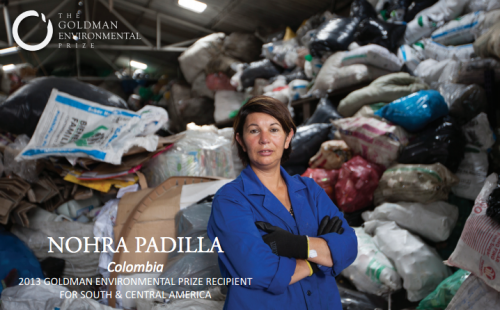
The article about Nohra Padilla produced by the Goldman Environmental Prize. Image courtesy: Golman Environmental Prize.
Congratulations, Nohra Padilla, informal recycler and leader with the Association of Recyclers of Bogotá and the National Association of Recyclers in Colombia, for winning the Goldman Environmental Prize for South and Central America. This prize has been called the environmental “Nobel” or “Oscar”. The prize acknowledges Nohra’s role in the growth of the city’s cooperatives and their expansion into Association of Recyclers of Bogotá (ARB), an organization that represents the city’s 3,000 informal recyclers, and the National Association of Recyclers in Colombia (ANR), with 12,000 members strong. The prize credits Nohra and the recyclers for “revolutionizing the waste management infrastructure in Colombia” and celebrates her court victories that include waste pickers as formally recognized stakeholders in Bogotá’s waste management system. In the biography of Nohra published by the Goldman Prize, it says the court victory was “…a much-needed affirmation of their fundamental right to work and the government’s acknowledgment of the necessity and benefits of recycling.”
Nohra Padilla, informal recycler and leader, wins the Goldman Environmental Prize
Video of Nohra’s acceptance speech and photos of the awards ceremony plus visits to San Francisco’s recycling program and Zero Waste program
South African delegates visit Brazil and Colombia to learn about inclusive waste management (April 2013)

South African government delegates visiting waste pickers’ cooperative CooperLimpa in Diadema, São Paulo. Photo credit: WIEGO.
In the beginning of April of this year, officials from the South African Department of the Environment (chemical and waste management branches) were in Brazil and Colombia to learn about inclusive solid waste management. The delegates went straight to the heart of the the Brazilian movement, to the MNCR‘s headquarters in São Paulo. They continued on to Belo Horizonte, where they visited a cooperative and met with members of the Municipal Waste and Citizenship Forum. Their last stop in Brazil was Diadema, in the industrial belt of São Paulo, where they visited CooperLimpa cooperative, learned from waste pickers and city leaders about the city’s participatory waste management model, and also met with the mayor. Their final stop in Latin America was Colombia, where they met with the Association of Recyclers of Colombia (ARB), whose court victory and long struggle has recently resulted in the informal recyclers becoming responsible for the city’s recycling collection and processing, and receiving payment as service providers. The learning exchange was facilitated by Women in Informal Employment: Globalizing and Organizing (WIEGO). More about the visits soon!
Mary Robinson, former president of Ireland, mentions the role of the Global Alliance in mobilizing people across the globe

Mary Robinson, Ireland’s first female president, on why women will bear the brunt of global warming. Photo credit: Daily Beast.
Mary Robinson was Ireland’s first female president. Today she is a member of Nelson Mandela’s Elders and the president of the Mary Robinson Foundation–Climate Justice—and a 2009 recipient of the U.S. Presidential Medal of Freedom. On International Women’s Day, she was interviewed by The Daily Beast, discussing why women will bear the brunt of global warming. In her interview, she says, “I think that over the next 20 years in Africa, we will see dramatic increases in women participating, and I have no reason to think that wouldn’t be true in other parts of the world. And it’s also happening in the informal sector, of the poorest—the Shack/Slum Dwellers International of Sheela Patel, the Global Alliance of Waste Pickers. Numbers matter in a world that now can be connected so easily by mobile phone, by Internet. And very often it’s women—not exclusively, but very often it’s women who are mobilizing hundreds of thousands of people.”
Tweet


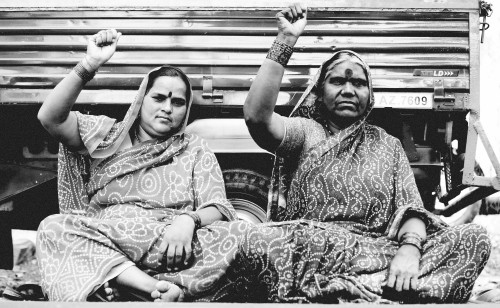

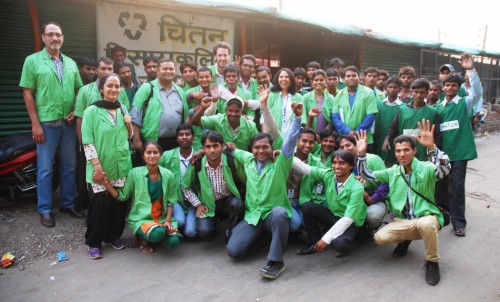
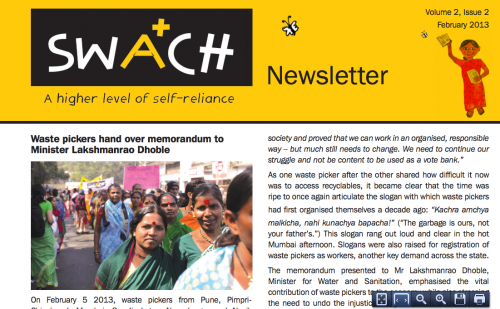
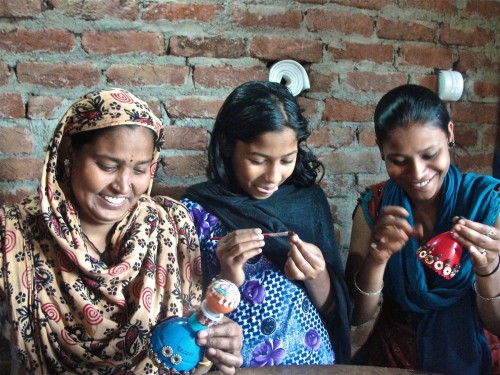
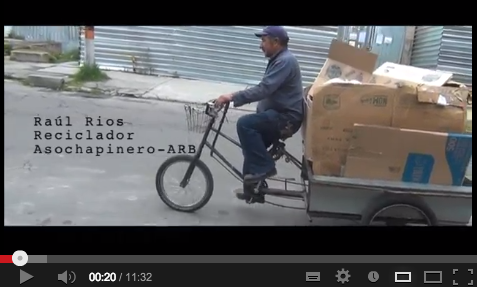
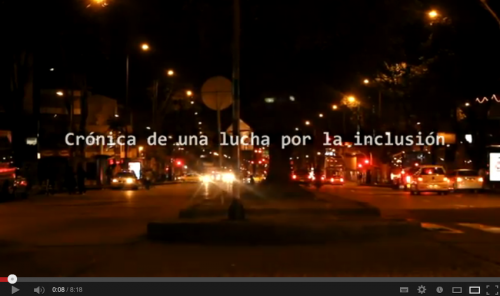




Leave a comment